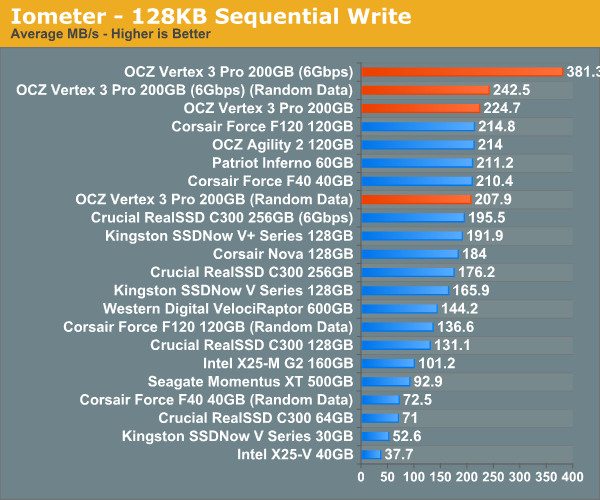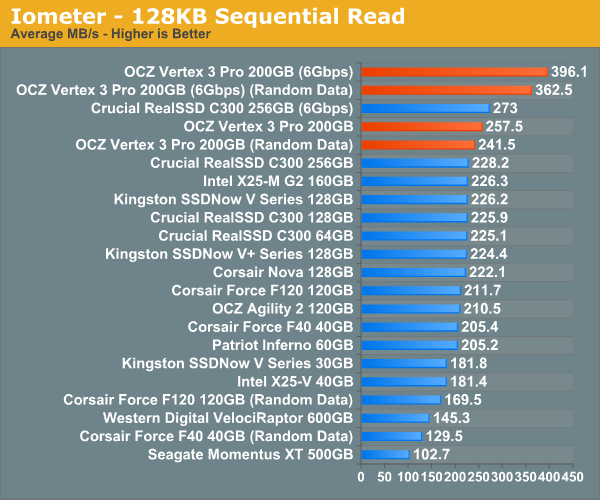OCZ Vertex 3 Pro Preview: The First SF-2500 SSD
by Anand Lal Shimpi on February 17, 2011 3:01 AM ESTSequential Read/Write Speed
To measure sequential performance I ran a 3 minute long 128KB sequential test over the entire span of the drive at a queue depth of 1. The results reported are in average MB/s over the entire test length.

This is pretty impressive. The new SF-2500 can write incompressible data sequentially at around the speed the SF-1200 could write highly compressible data. In other words, the Vertex 3 Pro at its slowest is as fast as the Vertex 2 is at its fastest. And that's just at 3Gbps.
The Vertex 3 Pro really shines when paired with a 6Gbps controller. At low queue depths you're looking at 381MB/s writes, from a single drive, with highly compressible data. Write incompressible data and you've still got the fastest SSD on the planet.
Micron is aiming for 260MB/s writes for the C400, which is independent of data type. If Micron can manage 260MB/s in sequential writes that will only give it a minor advantage over the worst case performance of the Vertex 3 Pro, and put it at a significant disadvantage compared to OCZ's best case.
Initially, SandForce appears to have significantly improved performance handling in the worst case of incompressible writes. While the old SF-1200 could only deliver 63% of its maximum performance when dealing with incompressible data, the SF-2500 holds on to 92% of it over a 3Gbps SATA interface. Remove the SATA bottleneck however and the performance difference returns to what we're used to. Over 6Gbps SATA the SF-2500 manages 63% of maximum performance if it's writing incompressible data.
Note that the peak 6Gbps sequential write figures jump up to around 500MB/s if you hit the drive with a heavier workload, which we'll see a bit later.

Sequential read performance continues to be dominated by OCZ and SandForce. Over a 3Gbps interface SandForce improved performance by 20 - 40%, but over a 6Gbps interface the jump is just huge. For incompressible data we're talking about nearly 400MB/s from a single drive. I don't believe you'd even be able to generate the workloads necessary to saturate a RAID-0 of two of these drives on a desktop system.










144 Comments
View All Comments
slickr - Thursday, February 17, 2011 - link
Now this is what I'm talking about about reviews/previews. Tons of benchmarks at various settings and loads. You can really make a difference now and see how the drives perform.I would also like a good old fashion test with Starcraft 2, how long it takes to load a 5-6mb custom map.
I would also like another test where you select 30 files and open them at the same time and see how much time it takes to open all. I'm talking about selecting few 3-5mb images, few MP4 360p videos, few H.264 720p videos, dozen office documents from 500kb up to 3mb, several applications like GPU-z, skype, Live, Xfire, firefox etc... and opening few highly compressed script files.
MamiyaOtaru - Thursday, February 17, 2011 - link
smaller process, less reliability, and higher price? We've been waiting for years fr prices to become reasonable next to magnetic storage but there's been barely a drop at all, and the drops that do come (smaller processes, supposedly) reduce reliability. At this point I don't see myself ever getting one for my desktop.Laptops sure, hard drives die there all the time, and I don't use them as my primary machine. Smaller storage requirements + hard drives dying far more often in laptops makes SSDs the better choice for me there.
Chloiber - Thursday, February 17, 2011 - link
I do generally agree. I don't want faster drives, I want cheaper drives. They are already very fast. Of course, faster is always better but at the moment I prefer low price and reliabilty over speed.seapeople - Friday, February 18, 2011 - link
Seriously... I don't need a brand new controller that might or might not be reliable and is so fast that it would still seem fast if I taped myself using the computer and replayed it in slow motion. What I want is an x25m-like drive at 160 GB for under $200. Still extremely fast, legendary (for SSD's) reliability, and make it affordable.The reason I don't buy Ferrari's right now is not because I don't think they're fast enough, it's because they COST too much.
RU482 - Thursday, February 17, 2011 - link
this might be the problem with OCZ. They are an SSD marketing company with a manufacturing divisionTimK - Thursday, February 17, 2011 - link
Damn, Anand, so this is what an engineering degree will get you, not to mention some heavy duty skill at writing. Comprehensive and comprehensible. Thanks very much. At your recommendation I bought an early Vertex 30GB SSD for my unibody MacBook. From time to time I take it out, thinking to have everything in one place on a bigger drive, but I just can't let go of the speed. It's still working great.dlang1234 - Thursday, February 17, 2011 - link
The Samsung 470 seems to be in a lot of the benchmarks but not all, and seems to do well in every one that it is listed in.I can't seem to find a review of it here, but would be interested in it possibly.
markjx1 - Thursday, February 17, 2011 - link
No mention of the fact this thing was originally slated with the SF-2000 controller, which proved to be plagued with problems in the lab and the dirty little secret no vendor would discuss at CES which was why no one had anything SF-2000 based up and running. And now OCZ had to resort to slapping Sandforce's enterprise class SF-2500 controller on it.Great except its going to be hella expensive and not cost competitive with the Crucial C400 unless OCZ bleeds margin, and given they took a $25 million bank loan recently, well let's just say OCZ isn't a company I'd rely on to fulfill a warranty replacement a couple years down the road when your drive dies.
Lastly, notice the "hardware isn't final" disclaimers all over the article. This is nothing more than OCZ trying to get some buzz, and have painted themselves into a corner now if they go switching back to the SF-2000 since they've already set expectations high.
jwilliams4200 - Thursday, February 17, 2011 - link
I thought the article was fairly well done. The only problem I have with it is a passing mention to the SSD being unusuable on a Macbook Pro, and yet not a single benchmark shows any problems with the SSD. It seems the benchmark suite Anand is using needs to have some more components added. Perhaps a latency test?Anand Lal Shimpi - Sunday, February 20, 2011 - link
Check back on the site by the end of the week ;)Take care,
Anand